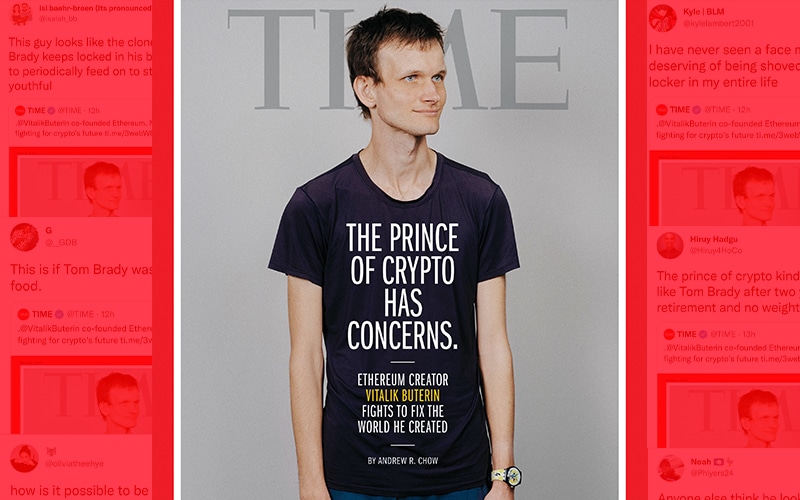Ethereum co-founder Vitalik Buterin is featured on the cover of the latest Time magazine issue. The issue titled ‘The Prince of Crypto Has Concerns’ on Vitalik Buterin’s fight for the future of Ethereum is by Andrew Chow, the editor of TIME’s Into the Metaverse newsletter.
Vitalik gave an interview which lasted about 80 minutes to Time Magazine after the ETHDenver closing party. “Crypto itself has a lot of dystopian potential if implemented wrong,” he stated.
Ethereum has made a handful of white guys unfathomably wealthy, became a vehicle for tax fraud, money laundering, and scams, Vitalik noted.
Buterin is concerned about the risks posed by overly optimistic investors, rising transaction costs, and wealth displays, all of which are influencing the public’s opinion of cryptocurrency.
He made the following comment on the famous Bored Ape Yacht Club, “that has become a digital-age status symbol for millionaires including Jimmy Fallon and Paris Hilton.” He stated, “The peril is you have these $3 million monkeys and it becomes a different kind of gamblin.”
Vitalik Buterin now hopes Ethereum will become the launchpad for all sorts of sociopolitical experimentation. For example, more equitable voting systems, urban planning, universal basic income, public-works projects, etc.
He admits that his vision for Ethereum’s transformational power is in danger of being overrun by greed. As a result, he has grudgingly begun to play a larger public role in molding its future.
Buterin did not foresee the rise of NFTs and has been watching the situation with interest and anxiety. On the one hand, they have aided in the acceleration of Ether’s price, but their volume has overburdened the network, resulting in a sharp increase in congestion costs.
Buterin definitely comprehends why people are abandoning Ethereum. He says he’s comfortable with it, especially given that Ethereum’s current issues arise from its overabundance of users.
Meanwhile, he and the Ethereum Fund which, according to a spokesman, keeps about a billion dollars in Ether in reserve, are pursuing a number of strategies to improve the ecosystem.
He has also matched thousands of dollars in donations amid the Russia-Ukraine crisis and loudly criticized Putin’s invasion decision. The war is personal to Buterin, who has both Russian and Ukrainian ancestry.
“One silver lining of the situation in the last three weeks is that it has reminded a lot of people in the crypto space that ultimately the goal of crypto is not to play games with million-dollar pictures of monkeys, it’s to do things that accomplish meaningful effects in the real world,” Buterin noted about the war on Ukraine.
The worst-case scenario for the future of cryptocurrency, according to Buterin, is that blockchain technology ends up in the hands of authoritarian governments.
He is dissatisfied with El Salvador’s legalization of Bitcoin, which has been marred by identity theft and volatility. One of the reasons Buterin is insistent about crypto remaining decentralized is the possibility of governments utilizing it to suppress dissent.
Vitalik and his criticisms against controlling governments have been prevalent. At the ETHDenver conference itself, he was calling out the Canadian government for trying to constrain the funding for the protesting truckers’ rally show. Government and police can continue to operate legally and track down suspects without the need for financial intermediaries, he argued.
Buterin believes that if Mark Zuckerberg shouldn’t be able to make game-changing decisions or profit from users’ data, neither should Buterin, even if it limits his ability to shape the future of his creation, sends some people to other blockchains, nor allows others to use his platform in unethical ways.
“I would love to have an ecosystem that has lots of good crazy and bad crazy,” Buterin noted towards the end of the interview.






